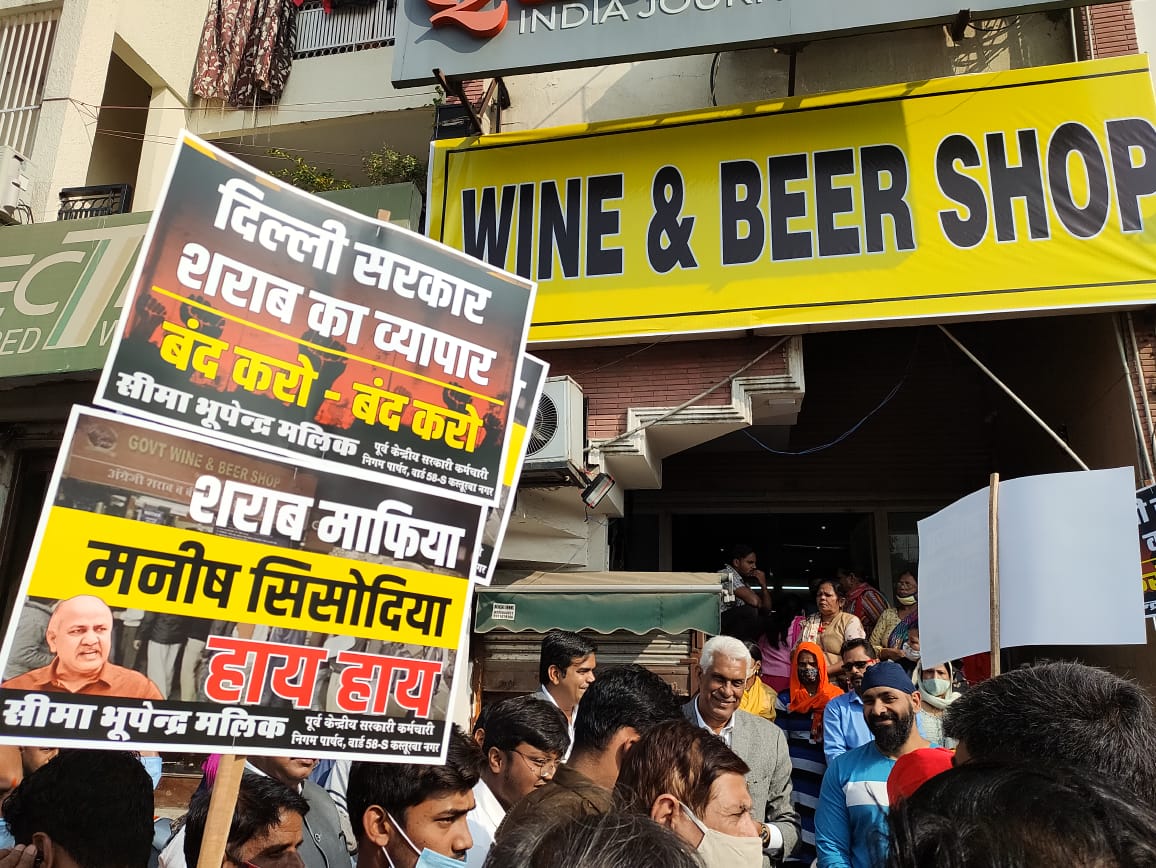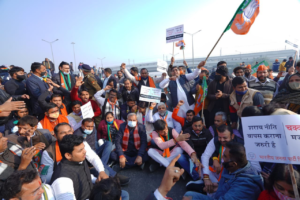BJP continues slugfest with AAP over new liquor stores in Delhi

BJP Protesting against the new excise policy in front of a liquor shop (Photo: MIG Photos/Aman Kanojiya)
On November 17, when Delhi saw the opening of 850 brand new and swanky liquor stores, as part of the new excise policy of the government, they represented different things for different people, especially the political parties. For the ruling Aam Aadmi Party, the new stores were part of a policy that streamlined the entire process of liquor vending in the national capital and a major crackdown on the allegedly rampant tax evasion that had taken place under the previous policy.
But for the Bharatiya Janata Party, the principal opposition party, the new policy and the new stores were aimed at promoting a ‘liquor culture’ in the city and that it made it too easy to get liquor anywhere in Delhi, especially near the residential areas religious spots. The BJP also accused the AAP of expanding the number of liquor stores in the city.
The liquor vendors who lost their licences under the new tender were obviously unhappy about losing a near-monopolistic business, while the owners of the newly-opened stores were looking forward to reaping rich returns on their investments.
However, the consumers, or at least some of them, the new policy has changed few things and not necessarily for the better. “There is no difference between the consumer experience when compared to government liquor shops and the shops right now. However, there are long queues in front of the shops. Earlier there used to be at least three shops in our area, but now there is only one shop, so naturally there is a crowd in front of the shops. The shop owners due to such huge crowds are encouraging people to use cash instead of digital currency be it card or Google Pay. The customers are told to step out of the line if they don’t have cash for by alcohol,” says Salauddin Ghalib, a self-employed resident of South Delhi.
What Ghalib recounts flies in the face of the entire campaign that has been built by the BJP against the new excise policy, whose central theme is that there are far too many liquor stores and that it has become very easy to buy alcohol anywhere in Delhi. Indeed, the party has been running protest against the new policy, alleging that Delhi government is using it to illegally open liquor stores across the city and claiming that shops are being opened near residential and religious places. As part of this campaign, the party also staged massive roadblocks or chakka jam earlier this week, creating huge traffic jams all over the city.
What does the new policy entail?
As per the new Excise Policy 2021, the government has divided Delhi into 32 zones and has allotted licenses on a zonal basis, with three stores in each of the 280 wards. It has also privatised the entire liquor business in the city-state. The number of stores open across the city stands at 849, down from 863 under the previous policy.
As per data, in the pre-Covid era Delhi had 863 liquor stores till the month of September 2019. And currently, the number stands at 849, with the city being divided into 32 zones comprising 280 wards and each having 3 liquor stores, marking a slight decline.
Another fact that goes against the BJP is that the total number of liquor stores as a proportion of the population of Delhi is far lower than the same in two adjoining districts, both in states ruled by the BJP. As per the 2011 census Delhi is home to 17 million residents, while NCT (National Capital Territory) regions of Gurugram, Noida and Greater Noida all together housed 3.1 million residents in 2011. are about 280 liquor stores while for Noida and Greater Noida the number is 524. Thus, for every 100,000 people there exist only 4 shops in Delhi, while in Gurugram and Noida-Greater Noida, there are 25 liquor stores per 100,000 persons.
Why is it a problem in Delhi and not in other BJP led states?
The friction in Delhi between the BJP and AAP is a natural rivalry between two principal opponents, as it would exist in any democracy. In Delhi, however, governance becomes challenging due to fractured power distribution as the local bodies – the three municipal corporations – that run hyper-local matters are all ruled by the BJP, while the state is ruled by the AAP, which won a second mandate handsomely in 2020, bagging 62 of the 70 assembly seats, while the BJP got 8. At top of the pyramid in the national capital is the lieutenant governor, appointed by the central government, again headed by the BJP. Thus, there are frequent conflicts between various levels of governments in Delhi and the liquor policy is one such point of conflagration.
Protest against alcohol sales is not something new and several politicians have used the issue as a ticket to winning elections. For instance, in Bihar, when women began protesting against alcohol sales, after several deaths in the state due to spurious liquor, chief minister Nitish Kumar used it to win the 2015 elections and retain the job. Following through on his promise, he declared Bihar a dry state in 2016 and made stringent rules against sale, distribution or consumption of alcohol. However, unlike Bihar, in Delhi there has not been any major protest by women or social activists seeking a ban on it. But the BJP stands by its protest. “We rightfully staged the chakka jam as we don’t want Delhi to become a state always drunk with alcohol. We see that numerous liquor shops have opened up selling alcohol to the public illegally. We believe that Kejriwal government wants the generation to take up alcoholism as they have reduced the legal drinking age from 25 to 21 proving it (AAP) wants to promote alcoholism,” Naveen Kumar, head of media cell of BJP Delhi, tells Media India Group.
“The government is encouraging consumption of alcohol, especially by women. They are constructing pink pubs, bars and liquor shops dedicated to the sale of alcohol to them. They are even giving a discount of 30pc to any women who will drink after midnight in those bars and pubs,” adds Kumar, who failed to back up his claim with any evidence.
Why a new policy?
AAP, for its part, rubbishes claims of the BJP, calling them unfounded. “We have nothing to hide. Delhi Police comes under the authority of the BJP and if, so much illegal alcohol is being sold then why don’t they launch an investigation and close all the illegal shops? If they have such a problem with the selling of alcohol, then why don’t they stop the sale everywhere? All their ruled states, whether it be UP or anywhere else there also alcohol is being sold without any restriction. In every alley, there is an alcohol shop,” Minnatulla Khan, secretary of AAP Okhla, tells Media India Group.
AAP justifies the new policy saying it boosted the government revenues but cutting off tax evasion and that the government collected a hefty INR 89.11 billion as licence fee upfront from all new stores. In addition, the government hopes to raise another INR 20 billion in other taxes, a significant rise from last year. AAP says it has used these funds to carry out its pro-people programmes like subsidised power and water to the underprivileged sections as well as carry out developmental activities in health and education sectors.
Khan dismisses the allegations of providing a discount to female consumers by the government. He says that the allegations are bogus and have no credibility. He says the real reason behind the protest is the upcoming election to the three municipal corporations in Delhi, where the BJP is currently ruling, but will lose. “They conducted an internal survey to know their standing for the upcoming municipal polls and found only 30 to 32 pc are in their favour. This is their last attempt to make a stand while they are still in power and get their house in order,” says Khan.
Broadly, the buyers remain divided on the protest staged by BJP. “This was needed. Many stores have popped up here and there. I will say that there must be some restrictions on the selling of alcohol,” says Vicky Poddar, a resident of Delhi, who is self-employed.
“There was no need for such kind of protest, it was just a political stunt. I would just say that alcohol shouldn’t be sold in residential areas whether it be Delhi, Gurugram or NCR or any other city. This kind of thing was in Haryana, but it has now come to Delhi, we are not liking it, but I think this issue doesn’t have much gravity but is definitely a stunt by the BJP,” says Vicky Arya, another resident of Delhi, who works in the real estate business.
The BJP says irrespective of the support from people, it will carry on with the protest. “We don’t care if we get the support of public from the protest we staged or not. We don’t want Delhi to become an alcohol ridden state. We see that young children are drinking alcohol, under the influence of alcohol they will indulge in thefts, murder, rapes and God knows what all,” says Kumar.










